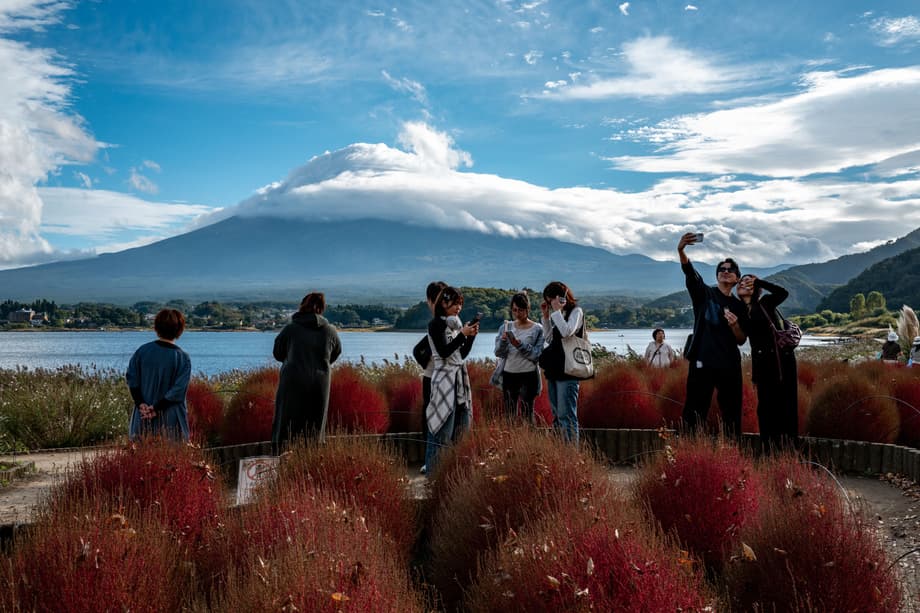Travel warning escalates row over Taiwan and rattles tourism
China has urged its citizens to avoid traveling to Japan, heightening a fast moving dispute triggered by Prime Minister Sanae Takaichi’s comments about a Taiwan conflict. In a late Friday notice, Beijing said recent statements by Japanese leaders have harmed the climate for exchange and created risks to Chinese nationals in Japan. The warning, while not a ban, signals that China is prepared to use travel and consumer flows in a political dispute. It arrived alongside a sharp message from China’s defense authorities, who cautioned Tokyo against any military role if fighting erupted in the Taiwan Strait.
- Travel warning escalates row over Taiwan and rattles tourism
- What the travel advisory says and how it works
- Airlines and tourism brace for fallout
- Beijing and Tokyo harden their lines
- Military signaling and regional security stakes
- What it means for travelers and businesses
- Domestic politics in Japan and China
- Could a Taiwan crisis draw in Japan
- At a Glance
The advisory followed a week of protests and ambassador summonses between the two governments. Airlines in mainland China quickly offered refunds and no fee changes for Japan routes. The dispute centers on Takaichi’s answer in parliament that a Chinese attack on Taiwan could be a situation that threatens Japan’s survival, opening the door to collective self-defense. Taiwan is self-ruled and claimed by China, and the strait is a flashpoint that involves the United States, Japan’s treaty ally. That mix of law, geography, and alliance ties helps explain why a single remark can reverberate across diplomacy, security planning, and tourism.
What triggered the warning
On November 7, Takaichi told lawmakers that if China used force against Taiwan, Japan could face a survival threatening situation. Under laws passed in 2015, Japan can exercise the right of collective self-defense in limited cases when an attack on a close partner endangers Japan’s survival and the government judges there is no other way to protect citizens. The statement did not declare a policy shift. It described a hypothetical worst case that sparked intense reactions in Beijing.
Successive Japanese leaders have avoided explicit talk of a military response tied to Taiwan. That caution reflects Article 9 of Japan’s constitution, which renounces war, and decades of policy built around an exclusively defensive posture. The 2015 legislation created narrow conditions where Japan could aid an ally under attack, but any use of force would still require strict tests and parliamentary oversight. The United States maintains a policy of strategic ambiguity regarding Taiwan, keeping its exact response undefined while supplying defensive arms to the island. That ambiguity seeks to deter both a unilateral declaration of independence and a forced unification.
Geography sharpens the debate. The nearest Japanese islands sit roughly 110 kilometers from Taiwan. Japanese air and sea lanes would be central to any regional crisis. US forces in Japan would shape decisions in Tokyo, and any contingency planning by allies is viewed in Beijing as interference in its internal affairs. That is the backdrop against which a parliamentary answer became a diplomatic storm.
What the travel advisory says and how it works
China’s Foreign Ministry said the atmosphere for people to people exchanges had been severely damaged by remarks from Japanese leaders, adding that risks to the safety of Chinese nationals in Japan had increased. The notice advised Chinese citizens to avoid trips to Japan for the time being, and urged those already in the country to stay alert and follow local guidance.
In its statement, the ministry wrote:
The ministry and its missions remind Chinese citizens to refrain from visiting Japan for the time being.
Such advisories do not carry legal force abroad, yet they can reshape travel patterns quickly. Major carriers often align with official guidance, as seen with refund and change policies posted by Air China, China Eastern, and China Southern. In past disputes, suspensions of tour groups and package sales have compounded the effect by curbing the most price sensitive segment of demand.
Airlines and tourism brace for fallout
Chinese airlines moved quickly. Air China, China Eastern, and China Southern announced policies offering refunds or no fee changes on some Japan routes through year end. These steps lower the friction for travelers who decide to cancel and they often set the tone for the wider market. If mainland tour groups scale back, hotel bookings and retail sales in Japan could feel the impact within days.
Before the advisory, travel from China to Japan had rebounded strongly. Between January and September, nearly 7.5 million visitors from mainland China entered Japan, the most of any country or region in that period. China is also a key source of big spending visitors drawn to shopping and regional cuisine. A sudden pause in arrivals would register in duty free stores, department chains, and tourist districts from Tokyo and Osaka to Hokkaido and Kyushu.
Officials in Hong Kong echoed Beijing’s message, urging residents to exercise caution and put personal safety first if traveling in Japan. Their alert cited a rise in incidents targeting Chinese nationals since mid 2025. At the same time, several Western governments continue to rate Japan as a destination where travelers should take normal precautions. That gap shows how security assessments can reflect politics as much as street conditions.
Beijing and Tokyo harden their lines
Diplomatic messages escalated in parallel with the travel notice. Beijing summoned Japan’s ambassador and demanded a retraction of Takaichi’s remarks. Tokyo then called in China’s ambassador after a post from China’s consul general in Osaka used violent language about the Japanese leader. The post was deleted after a public outcry, but it fueled a surge of online criticism inside China aimed at Takaichi, Japan’s first woman prime minister.
China’s Vice Foreign Minister Sun Weidong told Japan’s envoy that the comments had damaged the political foundation of ties and warned against any interference in the Taiwan issue. He repeated that Taiwan belongs to China and is a core interest that cannot be touched.
Anyone who dares to interfere in China’s reunification cause in any form will surely be dealt a heavy blow.
Japan rejected calls to walk back the prime minister’s words. Foreign Minister Toshimitsu Motegi said there was no need to retract the comments because they were made in the context of a discussion of an existential crisis scenario. Chief Cabinet Secretary Minoru Kihara added that peace and stability in the Taiwan Strait are vital for Japan’s security and for the international community.
Military signaling and regional security stakes
China’s defense establishment paired diplomatic warnings with military rhetoric. The Defense Ministry said Japan would face a crushing defeat if it intervened in a cross-strait conflict. Commentaries in People’s Liberation Army outlets said China would deliver a direct blow if Tokyo stepped in. State media and military linked accounts circulated those messages widely in Japanese and Chinese.
China’s Ministry of Defense issued a stark warning in public statements about any Japanese move to join a Taiwan fight:
If Japan dares to intervene militarily in the Taiwan Strait, it will suffer a crushing defeat.
Chinese maritime authorities also announced live fire exercises in the central Yellow Sea early next week, a signal often used during periods of tension. While the area is far from Taiwan, such drills are part of a pattern in which Beijing showcases readiness and tests regional responses.
Japan hosts significant US forces and bases that would be central to any crisis involving Taiwan. Washington keeps its response uncertain under strategic ambiguity, a policy designed to discourage both coercion by China and a unilateral change of status by Taiwan. Tokyo’s recent security documents call for stronger deterrence and a rapid defense buildup focused on missiles, maritime patrols, and the southwest archipelago.
What it means for travelers and businesses
For travelers in Japan, the advisory does not change legal rights or local rules. Hotels, restaurants, mass transit, and tourist sites are operating normally. The Chinese guidance will still influence behavior because it pushes carriers to ease cancellations and gives travelers a clear signal to postpone trips. Group tours from mainland China are especially sensitive to official guidance and airline policy.
Retailers and hospitality firms in Japan may see quick declines in sales tied to Chinese visitors if cancellations mount. Airports, duty free shops, and urban shopping districts that rely on inbound visitors could face a slower holiday season. The scale depends on how long the advisory remains in place and whether it expands to include stronger language or additional restrictions.
For China based airlines, refund policies will hit near term revenue on Japan routes. Carriers can redeploy some capacity to domestic or Southeast Asian flights, but premium demand tied to Japan’s winter travel season will be difficult to replace. Travel platforms and online agencies face similar pressure as customers change itineraries and seek refunds.
Domestic politics in Japan and China
Takaichi has championed closer security ties with the United States and a faster defense buildup. She also must manage a complex economic relationship with China, Japan’s largest trading partner. That balance is harder each time the Taiwan issue rises to the surface, especially when language in Tokyo is interpreted in Beijing as a shift toward intervention.
In China, nationalist sentiment toward Japan has warmed and cooled over decades, and it has intensified at times of political friction. The backlash to Takaichi’s remarks, including the deleted social media post by a senior Chinese diplomat in Osaka, shows how quickly online outrage can shape a foreign policy moment. The current dispute also comes less than two weeks after Takaichi met with President Xi Jinping on the sidelines of an international summit, where both sides said they wanted constructive and stable ties.
Could a Taiwan crisis draw in Japan
Japanese law defines several categories of external crises. In an important influence situation, Japan can provide logistics and rear area support to partners, such as refueling, search and rescue, inspections, and transport, short of combat. In a survival threatening situation, the government could authorize limited collective self-defense, including use of force, if three strict conditions are met and the Diet approves. The line between those categories would be the core legal question if fighting breaks out near Taiwan.
Any decision would also turn on the role of US forces based in Japan. Facilities in Okinawa and across the main islands support US operations in the western Pacific. If those bases came under attack, the legal thresholds would change rapidly. For that reason, officials in Tokyo have worked to harden fuel depots, disperse aircraft, and invest in long range missiles, steps meant to raise costs for any attacker and to buy time in a fast moving crisis.
At a Glance
- China advised citizens to avoid travel to Japan following remarks by Prime Minister Sanae Takaichi on a Taiwan conflict scenario.
- The Foreign Ministry said risks to Chinese nationals in Japan have increased and urged those in the country to stay alert.
- Mainland carriers, including Air China, China Eastern, and China Southern, offered refunds or no fee changes on Japan routes.
- Beijing and Tokyo summoned each other’s ambassadors as the row intensified, with China demanding a retraction that Japan refused.
- China’s Defense Ministry warned Japan against intervening in a Taiwan conflict, using language about a crushing defeat.
- About 7.5 million visitors from mainland China traveled to Japan in January through September, signaling a large tourism stake.
- Hong Kong authorities urged residents to prioritize personal safety in Japan, citing a rise in incidents since mid 2025.
- Washington’s strategic ambiguity on Taiwan and the presence of US forces in Japan shape Tokyo’s legal and security choices.












